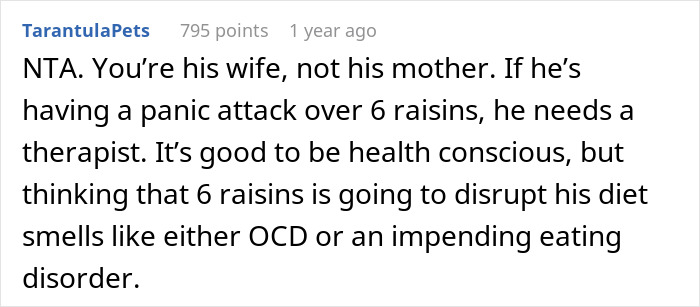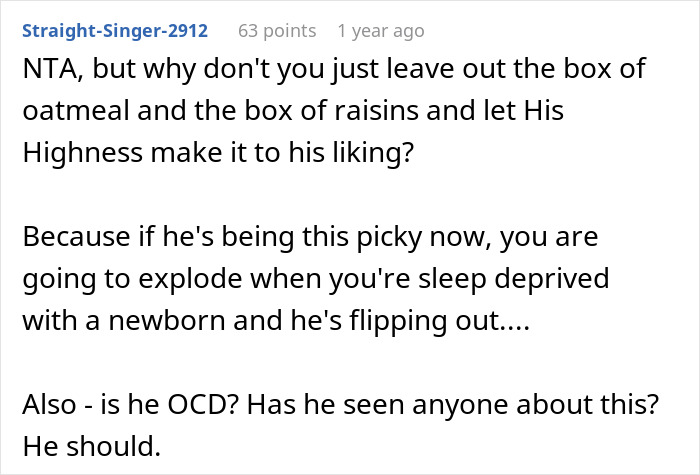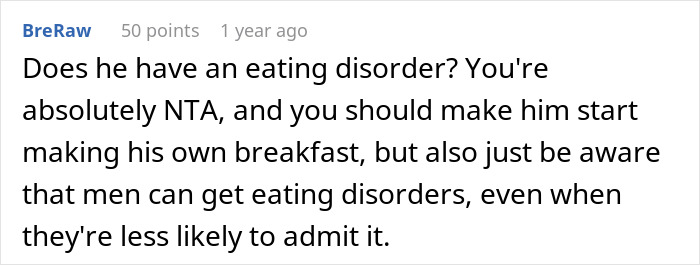Making a tasty meal for your partner is a nice gesture. It shows them you care, makes them feel appreciated, and strengthens the bond between two people. But what about the times when your partner doesn’t appreciate you for it? Even worse, when they get angry?
This woman had to deal with her husband’s tantrum over oatmeal. As the guy was very particular about the number of raisins he wanted in his breakfast, he exploded in rage when she put 18 instead of the usual 12 raisins in his oatmeal. The wife asked other netizens if she was a jerk for not counting them that one time, or was the husband at fault here?
Breakfast is the most important meal of the day, especially when your loving partner makes it for you
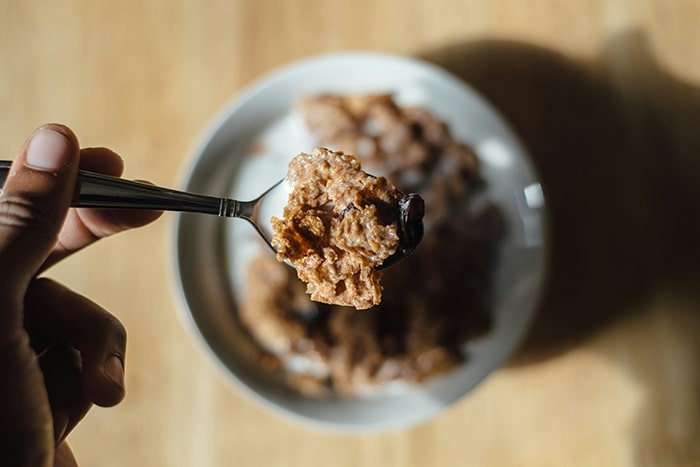
Image credits: Ryan Pouncy / Unsplash (not the actual photo)
But this guy didn’t think so when his wife put the wrong number of raisins in his oatmeal
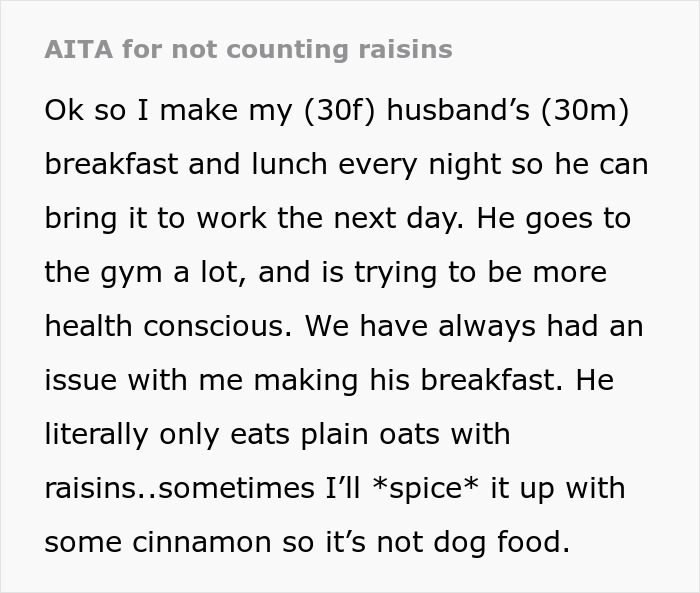
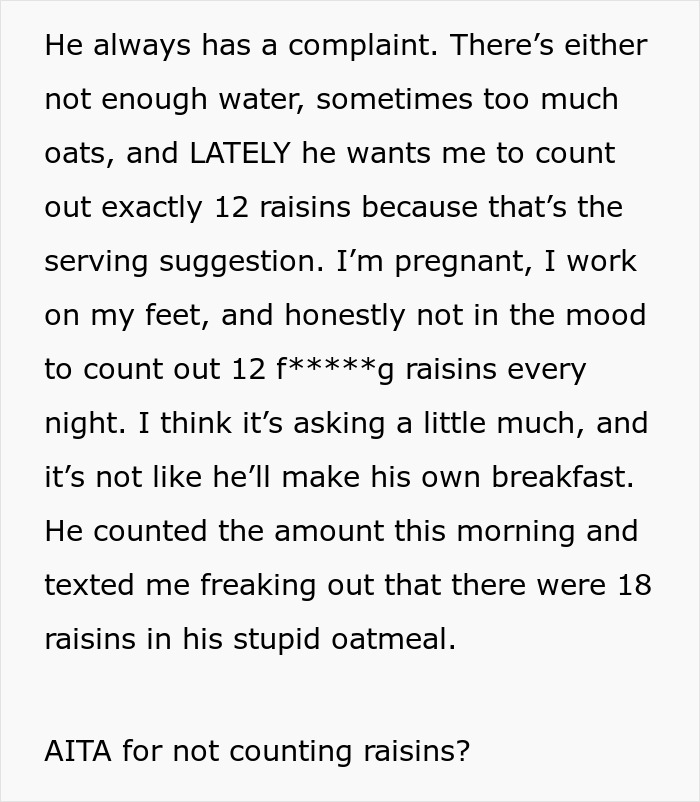
Image source: throwaway16274482736
Cooking for a partner is a nice way to show affection, but cooking together strengthens a relationship

Image credits: Anna Shvets / Pexels (not the actual photo)
For some, cooking is a hobby and an art. Others view it as a simple chore. A 2022 global Gallup survey revealed that women still cook more at home than men do. On average, women cooked nine meals a week, while men cooked only four. The survey showed one more interesting fact: women outcook their husbands in most countries but one: Italy.
There’s nothing wrong with making breakfast, lunch, or dinner for your partner or being the one who’s responsible for literally putting food on the table. Yet many experts actually recommend couples cook together. They say it can strengthen the relationship and make partners appreciate one another more.
A licensed relationship therapist, Jaime Bronstein, told Brides that doing any activities together creates a stronger bond. Cooking together requires patience, communication, and sharing responsibilities, so it’s a great exercise in working together. “Cooking together takes cooperation and planning. I believe a couple that cooks together stays together,” Bronstein said.
However, one partner doing the cooking is also a demonstration of love and affection. The saying ‘food is love’ is so widely known for a reason. “You are sharing, giving, and receiving love; it’s a win-win scenario,” Bronstein explained.
Eating disorders can manifest themselves in subtle ways
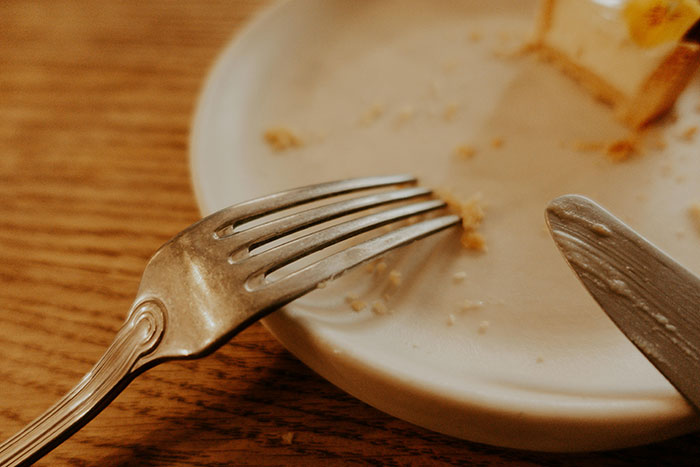
Image credits: Sami Aksu / Pexels (not the actual photo)
When we think of eating disorders, we most often picture women. The media we consume would have us believe that the signs of someone having an ED are quite visible: weight loss/gain, not eating or overeating, and obsessive calorie counting. In reality, men and boys develop eating disorders, too. The National Eating Disorders Association reports that 6.6 million males can be affected by an eating disorder at some point in their lives.
The husband in this story might just be a picky eater who wants his breakfast in a very particular way. However, in some cases, strange eating patterns and behaviors can signal a possible eating disorder. That’s what some commenters pointed out, as they asked whether he ever was diagnosed either with an OCD or some eating disorder.
Another misconception is that people who eat healthy can’t have an eating disorder. In reality, people who obsess over healthy foods might exhibit symptoms of orthorexia. It is an eating disorder defined by “an unhealthy obsession with eating healthy food.” However, it is not recognized by the APA as a psychiatric illness.
Kristen Ross, LLPC, CAM, a counselor at Beaumont’s Weight Control Center, says that people who are trying to improve their eating habits and eat more healthily are at risk of developing orthorexia. If they adopt an all-or-nothing mindset, they start to avoid certain foods in order to be “healthier.”
Orthorexia is defined by an unhealthy fixation on eating healthy
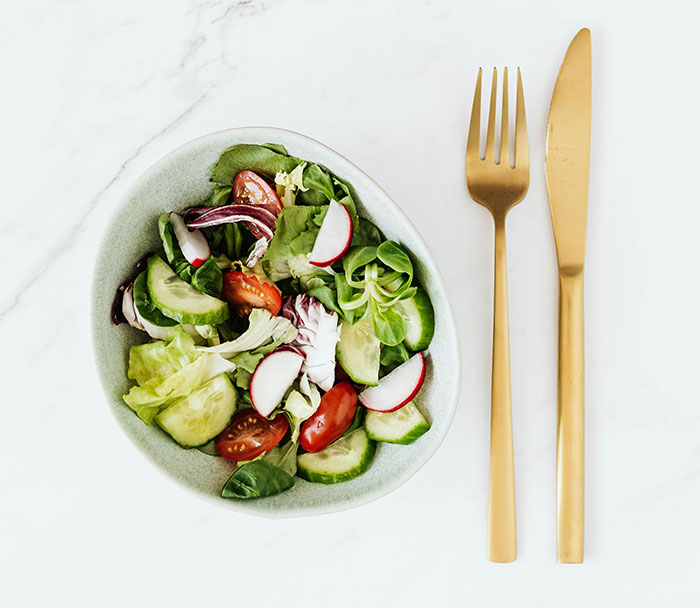
Image credits: Karolina Kaboompics / Pexels (not the actual photo)
The National Eating Disorders Association writes that worrying about eating healthy in and of itself isn’t a disorder. It becomes problematic when people start obsessing with healthy eating so much they “damage their own well-being and experience health consequences such as malnutrition and/or impairment of psychosocial functioning.”
NEDA lists compulsive checking of ingredient lists and nutritional labels as one of the signs of orthorexia. High levels of perfectionism is another. As of now, there are no clinical treatments for it, but ED experts treat it as a mix of OCD and anorexia nervosa. They encourage the person to eat a variety of foods and expose them to foods that provoke fear or anxiety.
At the end of the day, only an eating disorder specialist can diagnose someone with something like orthorexia. Observations from commenters on Reddit or any publications can only speculate. Those who worry their spouse or loved one might be experiencing symptoms of an ED should talk to them about seeing a specialist.
Some commenters suggested hilarious revenge tactics, and the wife had a chuckle at them



Others told her not to blame herself and said his obsessive behavior might be a sign of something more serious


